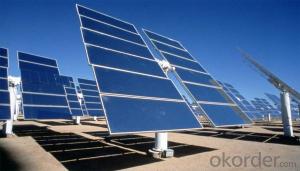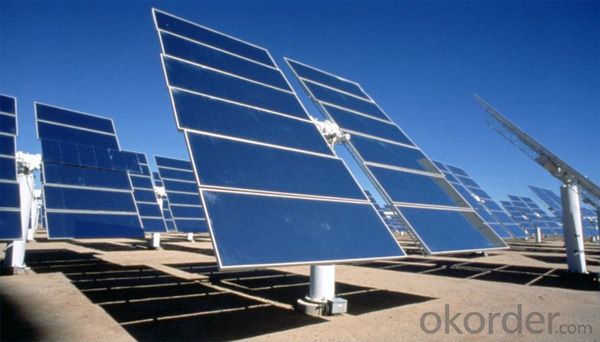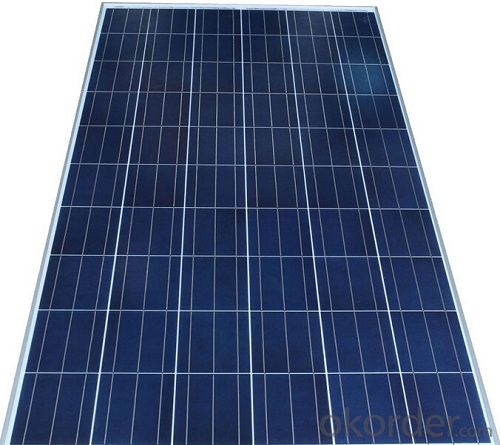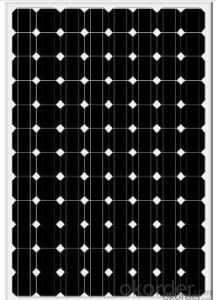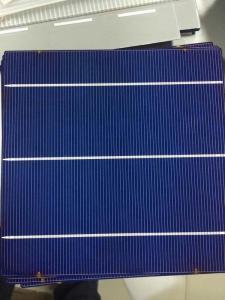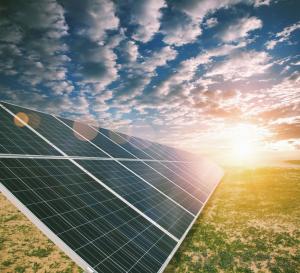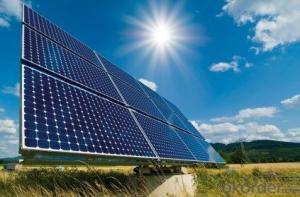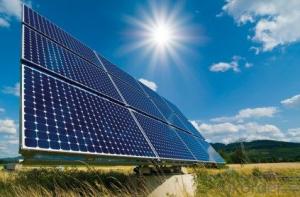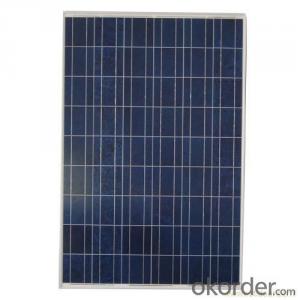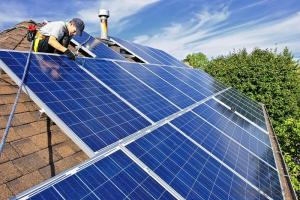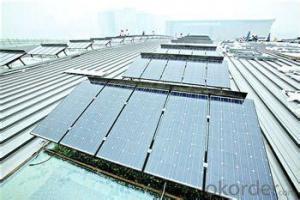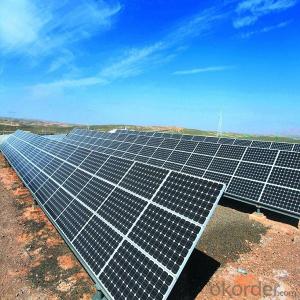Sunpower Solar Panels Cost - Solar Energy, Solar Power Panels, Solar Modules
- Loading Port:
- China main port
- Payment Terms:
- TT OR LC
- Min Order Qty:
- 10000 watt
- Supply Capability:
- 100000000 watt/month
OKorder Service Pledge
OKorder Financial Service
You Might Also Like
Specification
Production description
Monocrystalline Silicon Solar Panel (60-65W)
• 10 years 90% output warranty
• 20 years 80% output warranty
• High conversion efficiency mono/poly-crystalline amorphous silicon solar cells
• Modules incorporate high performance bypass diodes to minimize the power drop caused by shading
• High transmittance, low-iron tempered glass
• High performance EVA encapsulate to prevent destroying and water.
• AI frame: without screw, corner connection. 8 holes on the frame can be installed easily
• Good performance of preventing from atrocious weather such as wind and hails
• Certifications: CE IEC TUV VDE UL, Class I
Details
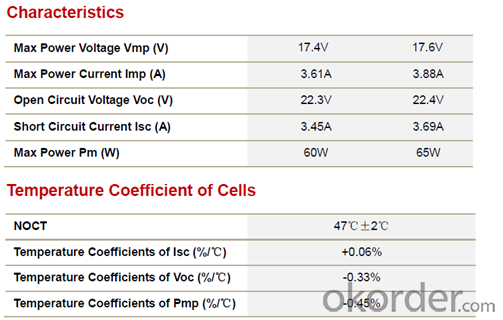
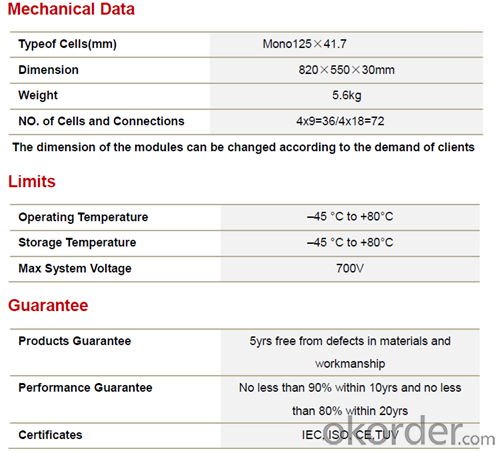

Images
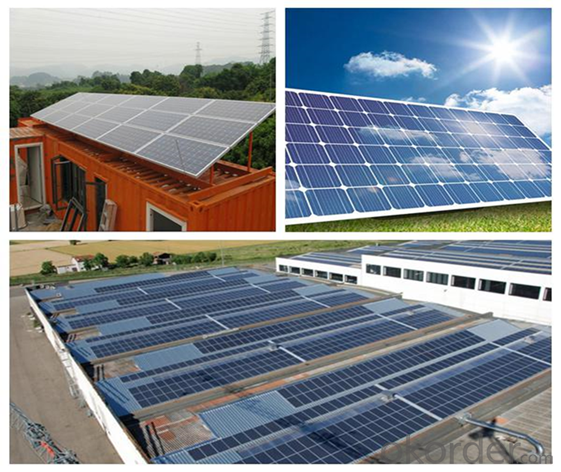
FAQ
We have organized several common questions for our clients,may help you sincerely:
1.What price for each watt?
It depends on the quantity, delivery date and payment terms,
2.How do you pack your products?
We have rich experience on how to pack the panels to make sure the safety on shipment when it arrives at the destination.
- Q: ASAP :) as much details as possible
- it would to reduce reliance on other sources of energy as solar is harnessed. It creates jobs for engineers and technicians. It has high initial cots, but is cheaper and stable in the long-run. Thus cost of production fall, AS curve shift downwards. Unemployment rate would fall as jobs are created. C rise. I rise.
- Q: So, I've seen cheap solar panel kits for sale from Harbor Freight, and regardless of whether or not I were to buy a set from them or someone else, I was wondering what the process of implementing a small-scale solar system into your household electrical system would be.I've read articles that started out too in-depth or were speaking of systems on a much larger scale.Can it be as easy as buying the panels and inverter, and plugging it into a socket, or is there more to it?Some of the articles I was reading had mentioned having to contract with your electrical supplier, having to have an electrician tie it all in in some special/ necessary way, using a battery pack (would this be necessary for a tied-in system?), or using the system to only power single items, like a water heater, or plugging items into a connected battery-pack, all of which I'm not sure is necessary or needed for what my goals/ means are/ would be.
- Grid tie inverters are expensive, but you might find a used one cheap on E-Bay, Crags list. Almost any grid tie inverter will work as you are thinking low power, but it likely needs to be 50 hertz or 60 hertz, which ever you have, and 230 volts ac or 20 volts ac which ever you have. It will work for a range of dc voltages, so your solar panels need to produce voltage near the center of that range. I considered buy the 3 PV panel set of 5 watt panels that Harbor freight sells. but I did not determine if the three panels can be conveniently connected in series to produce about 50 volts at light loads, or 00 volts if you buy two sets. You probably do not need the load controller, that comes with each set. I think most grid tie inverters automatically adjust to the dc voltage you supply them, unless it is below some minimum such as 50 volts. It is illegal to connect ordinary inverters to the power company, but they will probably not notice a small system unless you burn your house down. Most inverters will phase lock with the power companies frequency, but they are not designed to do that, so bad is likely unless you connect a resistor such as 0 ohms at 00 watts in series with the ac out of the inverter. If the resistor smokes you should disconnect promptly, then try again to see if you can get phase lock quickly. No smoke, likely means you are one of about 000 co-generators on the electric grid, You can short out the resistor with short piece of very fine wire which will hopefully melt if something goes wrong, such as the power company not sending electricity for 0. seconds or longer. Nearly all inverters have an over load feature, so the thin wire is a back up. Please be careful as people sometimes don't survive an electric shock at 20 volts.
- Q: I was wondering if they create other forms of energy besides electrical that is unwanted. Like heat due to the friction of something, or sound. Also why is a solar panel not able to collect 00% of the energy that is striking its panels. And how could the efficiency of this be hypothetically improved.
- Solar panels produce very little heat or sound compared to electrical energy. In terms of the sunlight striking the panels, solar panels have an extremely poor efficiency because they can't possibly absorb 00% of the light energy. Solar panel efficiency is usually given is terms of converting the light that IS absorbed into electricity. Improvements are happening constantly. Mainly, trying to maximize electrical conductivity.
- Q: I really would like to have my own solar panel, but i don't know how. Most of the panels i have looked at are for car batteries but i'm not sure how this would be able to be transfered into electricity. I'm looking to power things like lamps, a stereo and various chargers for phones and ipods. Please explain to me how i could adapt a solar panel to my uses. Thank you.
- Sounds okorder .. I've seen the particular device listed there. While the lamp is mediocre for an LED light source, the panel is excellent - real polysilicon wafers, in an aluminum frame. Same construction as the kind of panels in commercial installations.
- Q: Can solar panels be installed on wearable devices?
- Yes, solar panels can be installed on wearable devices. However, due to the limited surface area available on wearables, the amount of energy generated may be relatively low compared to larger solar installations. Additionally, the efficiency of such panels may vary based on the device's orientation to the sun. Nonetheless, incorporating solar panels on wearables can contribute to extending battery life and enhancing their overall sustainability.
- Q: Can solar panels be installed on bus stops or shelters?
- Yes, solar panels can be installed on bus stops or shelters.
- Q: Can solar panels be installed on a theme park or amusement park?
- Yes, solar panels can be installed on a theme park or amusement park. In fact, many theme parks around the world have already installed solar panels to generate clean and renewable energy. This not only helps to reduce their carbon footprint and dependence on fossil fuels but also saves them money on electricity bills in the long run. Additionally, solar panels can be integrated into the design of the park, complementing its aesthetic appeal and showcasing the park's commitment to sustainability.
- Q: If you buy everything you need for a grid-tied solar set up, can you install it yourself or is it required that a professional installs it?
- Depending okorder /
- Q: Can solar panels be used in areas with high levels of dust?
- Yes, solar panels can still be used in areas with high levels of dust. While excessive dust can reduce the efficiency of solar panels by blocking sunlight, regular cleaning and maintenance can help mitigate this issue. Additionally, advancements in technology, such as self-cleaning panels or coatings that repel dust, are being developed to further enhance the performance of solar panels in dusty environments.
- Q: Can solar panels be used for heating swimming pools?
- Yes, solar panels can be used to heat swimming pools. Solar pool heating systems use the sun's energy to heat the water in the pool, reducing the need for traditional heating methods and saving energy costs.
Send your message to us
Sunpower Solar Panels Cost - Solar Energy, Solar Power Panels, Solar Modules
- Loading Port:
- China main port
- Payment Terms:
- TT OR LC
- Min Order Qty:
- 10000 watt
- Supply Capability:
- 100000000 watt/month
OKorder Service Pledge
OKorder Financial Service
Similar products
Hot products
Hot Searches
Related keywords
